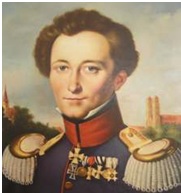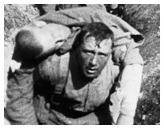|
 |
|
 |
|
|
||
Carl von Clausewitz
Leadership
Carl von Clausewitz (1780-1831)
German general (pictured right) whose military strategy book, On War (1832), has had a big impact on many generals including George Patton and Dwight D. Eisenhower.
What did he say about war?
1. Clausewitz's trinity This is Clausewitz’s term for the three factors affecting war:
a) passion (driving hatred and violence) So Clausewitz saw war as a clash of wills. “War therefore is an act of violence to compel our opponent to fulfil our will”, he wrote in On War.
b) probability and chance
c) reason and logic “Pity the theory that conflicts with reason!”, writes Clausewitz. So don't let jargon obscure the truth.
Success in war is dependent on government policy (see point 2) carried out by its armed forces and people (who provide the will or “engines of war”).
2. Politics is paramount Politics (and so policy) must determine what happens in war - the military mustn't dictate to politicians. “War is merely the continuation of policy by other means”, he wrote in On War So political leaders must be:
3. Execution isn't easy The implementation of even simple things in war are made difficult by “friction” resulting from:
a) unclear information (not knowing what the enemy is doing from poor communications and intelligence ). This is what Clausewitz called the “fog of war”
b) the strain of war (its physical and mental exertions).
The best way to overcome friction is to persevere through “strength of will”
4. Learn by doing Learn from:
a) practical experience (the best way to learn).
b) teaching and self-discovery The best teacher “guides and stimulates” others to learn for themselves. Rules shouldn't be imposed, if they suppress the truth.
c) analysing the reasons for success and failure.
d) history Vital lessons can be learned from history but don't distort it to suit false ideas and theories.
5. Numbers count “In tactics, as in strategy, superiority in numbers is the most common element in victory”, Clausewitz said.
6. The mind is mighty Victory depends on not only your army's size (see point 5), but also its “moral elements” which are:
a) the skills of the commander (see point 7).
b) the experience and courage of the troops.
c) the army's patriotic spirit which will be greatest when:
Therefore the aim of a battle should be to destroy the enemy's spirit.
7. Great leaders Military leaders must:
a) take the initiative through quick decision making (having boldness “disciplined by reflection”).
b) meet the needs of their situation.
c) be self-confident, energetic, inquisitive, courageous, and clever
d) be mentally tough
8. Go for the jugular The best strategy is to concentrate your forces and very quickly attack the enemy's “centre of gravity”, the key source of its power (like its capital city). But remember, says Clausewitz, “the only advantage of attack rests on its initial surprise”.
9. Defence can be deadly Exploit the advantages of defence (like shorter lines of communication), but always be prepared to turn defence into attack. 10. War is brutal Victory requires “the maximum use of force” and “brutal bloodshed”, so leading to the idea of 'total war' in the trench warfare of World War One (pictured right). “War is such a dangerous business that the mistakes which come from kindness are the very worst”, Clausewitz said. He also believed that strategy is the use of the battle for the purpose of war. In other words, battles are not ends in themselves but the means to a victorious war.
Key quotes on war War is merely the continuation of policy by other means Fighting...is a trial of moral and physical forces through the medium of the latter. Everything in war is very simple but the simplest thing is difficult. |
|
|
||
|
|
||
| Copyright © wisdomtowin.com 2025 All Rights Reserved | ||
|




